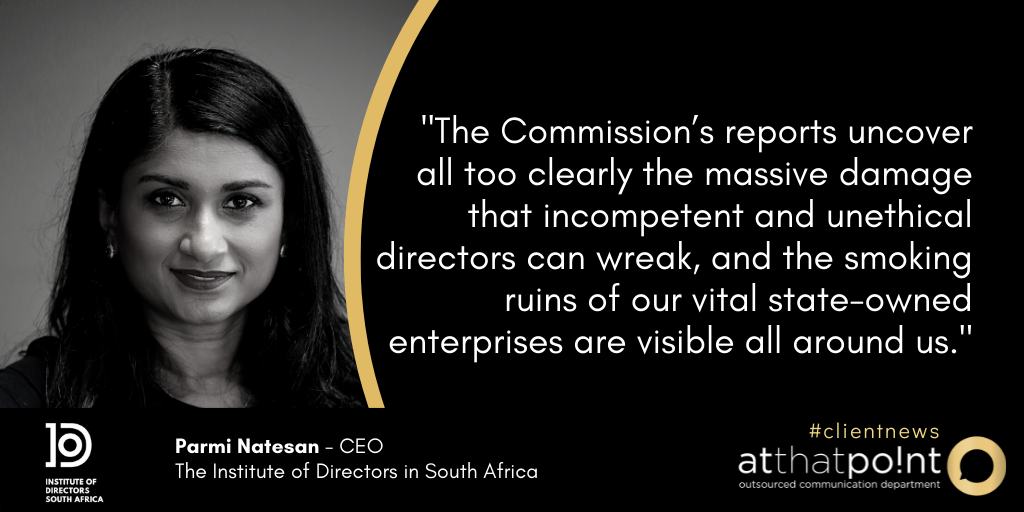 In its final report, the Judicial Commission of Inquiry into State Capture (Zondo Commission) recommends the enactment of legislation to establish a professional body for public procurement officials.[1] While there is no doubt this is a good move, the Institute of Directors in South Africa wishes to express its disappointment that its recommendation for a similar enforced body for directors was not acted on. “We wrote to the Commission in September 2021 setting out the compelling reasons to recommend the establishment of a statutory professional body for directors. By not doing so, we believe that the Commission missed a historic opportunity to alter fundamentally the governance landscape of the country for the better,” says Parmi Natesan, CEO: IoDSA. “The Commission’s reports uncover all too clearly the massive damage that incompetent and unethical directors can wreak, and the smoking ruins of our vital state-owned enterprises are visible all around us.” A mandatory professional body for directors would have the benefit of requiring that directors would have to keep their skills updated via a rigorous process of continuous professional development. The professional body would also be able to keep its members abreast of developments in governance best practice. Equally important, members of such a professional body would be bound by a code of conduct, in terms of which they could be rapidly disciplined and even have their membership terminated. Termination could in turn signal to the market to not appoint them as a director. “As we now contemplate the possibility of years of litigation to bring the main actors in state capture to book, establishing a mechanism through which unethical or incompetent directors could be swiftly and relatively inexpensively held to account looks very attractive,” she observes. The IoDSA further argues that alongside a statutory professional body for directors, there should be enforcement of formal director designations registered with the South African Qualifications Authority (SAQA). Such formal designations would provide a way to ensure that directors have the necessary competencies to serve as a director based on rigorous testing against a formal competency framework. Designation holders who fail to keep their skills updated in line with the CPD framework would have their designations removed, reducing their attractiveness to companies. The IoDSA already owns and awards two SAQA-recognised director designations—Certified Director (SA) and Chartered Director (SA). “Directorship is now a serious profession that requires individuals to possess a definite set of skills and competencies, and the ability to provide strong leadership based on sound ethical principles,” Ms Natesan concludes. “While this was not covered in the Commission’s final recommendations, the IoDSA will continue to lobby for directorship to become a regulated profession, providing both the public and private sectors with a growing pool of properly qualified individuals who have committed to ethical leadership and have signed on to a solid code of conduct.” ENDS MEDIA CONTACT: Stephné du Toit, [email protected], 084 587 9933, www.atthatpoint.co.za For more information on the IoDSA please visit: Website: www.iodsa.co.za Twitter: @The_IoDSA LinkedIn: Institute of Directors in South Africa Company Page Facebook: Institute of Directors South Africa [1] Judicial Commission of Inquiry into Allegations of Capture, Corruption and Fraud in the Public Sector Including Organs of State, Report: Part VI, Volume 4: Summary of Recommendations, 62, p24, available at www.statecapture.org.za/site/files/announcements/672/OCR_version_-_State_Capture_Commission_Report_Part_VI_Vol_IV_-_Recommendations.pdf.
0 Comments
Leave a Reply. |
Archives
July 2024
Categories
All
|

 RSS Feed
RSS Feed